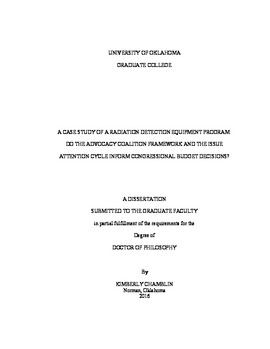| dc.description.abstract | The influence of policy knowledge and public interest upon the policy making process is described in this dissertation. The manner in which major policy change takes place, particularly as legislators gain technical understanding of an issue, is exhibited through this case study of a national security program. Specifically, this work concludes that steady increases in funding for the nuclear materials detection program were reversed as public interest waned and as legislators learned more about the limited efficacy of the program. These findings are consistent with hypotheses derived from the application of the Advocacy Coalition Framework (ACF) and the Issue Attention Cycle (IAC).
The ACF provides a basis for integrating factors external to the bureaucratic subsystem into analysis of policymaking processes. The research indicates that legislators applied the knowledge they gained through congressional hearings to a significant budget-related decision. At the same time, consistent with IAC, this work concludes that the timing of this major budget decision occurred alongside a significant decline in public attention. Combining the two theoretical frameworks, this dissertation offers a conclusion regarding how both policy-oriented learning and public issue attention influence policy change.
This case study is distinct because of the issue’s complexity and the broad public interest and bipartisan support it received. These circumstances led to a context that allowed me to consider what makes learning possible as legislators must constantly absorb tremendous quantities of information on a variety of topics. The characteristics of this case also provided me with the opportunity to develop an analytical schema to process complete data sets representing both related newspaper coverage and congressional hearings in an objective manner.
This project is an integrative model that shows linkages, indicating that the convergence of public issue attention and legislator policy knowledge factors is significant enough to account for the major radiation detection equipment policy change that took place in 2008 and 2009. Data reveal that radiation detection program budget decreases did occur in conjunction with a gradual decline in public attention and enhanced Congressional policy-oriented learning, and that broad initial coalition support for robust nuclear detection equipment funding eventually shifted to support other approaches to deterring nuclear terrorism. This finding should encourage additional research using the ACF and IAC to explain both sources of policy change and policy-oriented learning.
Keywords: policy knowledge, policy-oriented learning, Issue Attention Cycle, Advocacy Coalition Framework, subsystems, coalitions, stages heuristic, policy core beliefs, secondary policy beliefs. | en_US |
